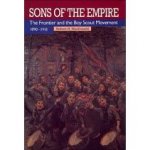Interesting choice of title by Andy
See this 1993 book on the British Empire
Sons of the Empire: The Frontier and Boy Scout Movement 1890-1910
In Sons of Empire, Robert H. MacDonald explores the place of the colonial military scout -- the tracker, forward observer, or guerrilla-like irregular -- as a popular figure in British military units and British public imagination at the end of the last century. Brought to military prominence by the exigencies of colonial warfare and to public attention by popular American accounts of frontiersmen and Indian fighters, the scout was Anglicized in the African campaigns and boy's adventure fiction of the nineties. But the most powerful promotion of the scouting ideal was through the Boy Scout movement. Founded by Baron Baden-Powell in 1908, the organization numbered over 150,000 members by the eve of World War I. MacDonald links public fascination with the scout to fin-de-siecle anxieties of degeneration and decadence. These anxieties, he argues, led many Englishmen to equate life in the "old countries" of the metropolitan core with decline.
And:
In Sons of the Empire, Robert MacDonalf explores popular ideas and myths in Edwardian Britain, their use by Baden-Powell, and their influence on the Boy Scout movement. In particular, he analyses the model of masculinity provided by the imperial frontier, the view that life in younger, far-flung parts of the empre was stronger, less degenerate than in Britain. The stereotypical adventurer - the frontiersman - provided an alternative ethic to British society. The best known example of it at the time was Baden-Powell himself, a war scout, the Hero of Mafeking in the South African war, and one of the first cult heroes to be created by the modern media.
When Baden-Powell founded the Boy Scouts in 1908, he used both the power of the frontier myth and his own legend as a hero to galvanize the movement. The glamour of war scouting was hard to resist, its adventures a seductive invitation to the first recruits. But Baden-Powell had a serious educational program in mind: Boy Scouts were to be trained in good citizenship.
MacDoanld documents his study with a wide range of contemporary sources, from newspapers to military memoirs. Exploring the genesis of an imperial institution through its own texts, he brings new insight into the Edwardian age.


